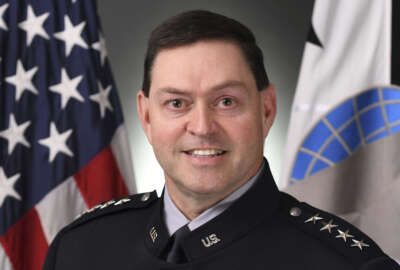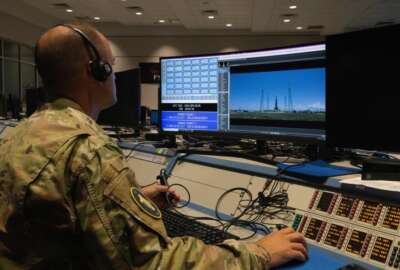
Why a Space Force captain went back to school
The Air Force and the business school at the University of Maryland have teamed up. Their program helps Air Force and Space Force officers get their MBAs,...
Best listening experience is on Chrome, Firefox or Safari. Subscribe to Federal Drive’s daily audio interviews on Apple Podcasts or PodcastOne.
The Air Force and the business school at the University of Maryland have teamed up. Their program helps Air Force and Space Force officers get their MBAs, specializing in technology management. The officers return as faculty members of the Air Force Academy. Ultimately they hope to speed up technology adoption by the armed services. Federal Drive with Tom Temin had an in-studio conversation with one member of the program, Space Force Captain Jared Bodgan.
Interview transcript:
Tom Temin
And now you started out in the Air Force and ended up in the Space Force, just tell us how that happened for a minute.Jared Bogdan
That’s correct. So after I graduated from the academy, in 2018, I spent about two and a half years in the Air Force as a satellite engineer. And then as the Space Force came to be, they identified about five core jobs that would transition from the Air Force into the Space Force. And as an engineer, I was one of those. So the Space Force started December 2019. And then starting in 2021, those organic career fields were able to transfer and so as an engineer, I moved over to the Space Force.Tom Temin
And they call you guardians, now, guardians out there in the galaxy, I guess, or something like that. So your interest is in technology adoption by the armed services, Air Force, Space Force, and I guess the rest of them, too. So how did this interest come about?Jared Bogdan
As I’ve seen, you know, through my short period of time in the armed services now, one of the main focuses is, how are we leveraging the capabilities of the private sector and then bringing those capabilities into the public ecosystem? You know, coming to the University of Maryland, I was credibly happy to see that this technology management program was coming to be because the focus was on how are we engaging with the private sector to bring those capabilities into the public ecosystem?Tom Temin
Got it. And so you are what full time in school? I mean, how does it work with respect to your career, day to day?Jared Bogdan
Yes, full time student at the University of Maryland. Afterwards, I return to the Air Force Academy and teach in their Department of Management, still active duty throughout being a student, as well as being faculty at the Air Force Academy.Tom Temin
Good. So then you are getting an MBA and what are the courses I think of MBA is a lot of marketing and statistics and that kind of thing. But, we’re talking about technology management.Jared Bogdan
So there are certainly those courses. There’s a core set of courses that we all take as MBA students, I’ve chosen to focus my MBA on kind of leadership and organizational change, as well as this technology management certificate that I’ve enrolled in. So the technology management certificate hosts a number of classes from law to partner with the engineering school. There’s a component of marketing in there. And then when I’m taking classes in College Park, that’s when I’m focusing on the leadership and organizational change and such.Tom Temin
Right and your undergraduate degree which you got at the Air Force Academy. Correct? That was engineering.Jared Bogdan
That was in astronautical engineering. Yes. And so that is what I think set me up for the job right afterwards in Albuquerque, New Mexico as a satellite operations engineer, and eventually, program manager.Tom Temin
Yeah, what do satellite operations engineer actually do? I mean, the satellites sits up there, and it goes around theEarth and beams down data.Jared Bogdan
Sure. Yeah. So in a perfect world, you’d never have to look at the satellite again, and kind of be a lights off operation, of course, things go wrong. And as a satellite engineer, at the time in the Air Force, I was working with a lot of contractors who developed and operate the satellite to assess scenarios where we may need to change a position or maybe a mission set changes, and we need to reposition something like that. And so in my role, I can’t say that they don’t exist, though. In my role, I wasn’t actually doing the engineering of the satellite, I was overseeing the operation and planning of a satellite mission.Tom Temin
So sometimes you have to send a signal to it to turn left a little bit or turn right. It has thrusters, right?Jared Bogdan
Correct. Yep. So if you need to do a basic maneuver to keep it in its spot in orbit, you can upload burn plans, and that’ll move it around just slightly. You’re also monitoring its health and safety throughout its orbit. And so every three, four times a day, you’ll do what’s called a contact with the satellite, where you’ll connect with it, get its telemetry down, make sure it’s still you know, 100% healthy, and then you’ll lose sight of it, and it’ll go on into it.Tom Temin
And hopefully it comes back to the the other side. We’re speaking with Space Force Capt. Jared Bogdan, he’s in the MBA program at the University of Maryland’s Smith School of Business. And what’s it like being the military guy in there with everybody else, maybe business oriented or not having been in the service?Jared Bogdan
So it certainly adds a different perspective. There are, I think, five or six of us veterans, and there’s one more active duty person in the MBA program that I am in. And so it certainly brings a different perspective to business challenges that we discuss. You know, I remember in an econ class, some of the questions that I was asking, you know, they pertain to the federal government and although that’s not common to most of the people in the program, it may affect them as you know, we see public and private sector relationships develop. And so I think one of the unique aspects that, you know, military members bring to programs that are typically private sector focus is, you know, what does that relationship look like? How can it be fostered, developed and facilitated?Tom Temin
And what in I guess, high school or even before that gave you the idea that this is the path you wanted to go toward the Air Force?Jared Bogdan
So this is a fun story, my mom, she suggested I go to the Coast Guard Academy. I’m from New Jersey, it was in New London, Connecticut. Turns out I’m colorblind. And so my options were the Air Force Academy or West Point, I chose the Air Force Academy, and it kind of all went from there.Tom Temin
But you must have been a smart cookie, because it’s not so easy to get into West Point or the Air Force Academy.Jared Bogdan
No, no, yes, I’d like to think so. The school I went to a very small school in New Jersey, but they did a great job of prepping everyone who goes there.Tom Temin
Why is color blindness, a handicap for the Coast Guard, but not for the Air Force, because you’ve got sky and sea and clouds and different colored instruments on the panel?Jared Bogdan
Well, so I think for the water faring services, they use the lights to discern, you know, indicators of ships and aircraft. color deficiency in the Air Force is a limiting factor, you know, I wasn’t able to be a pilot, though I was able to be an engineer. And there are a handful of jobs that you can do, where color vision is not a limiting factor engineer is one of them.Tom Temin
And what’s your long term goal? I mean, must be good to teach at the Air Force Academy yet it’s not very, I don’t know, there’s no motion to it.Jared Bogdan
Right. So that’s a three year assignment. Long term. You know, as of now, I think I’m on the 25 year track. In the Space Force, I enjoy what I do, I feel no reason to change what I’m doing. And as long as it’s fun, and I feel motivated by the work. I have no plans to get out.Tom Temin
And at some point, though, you’d like to get into the program management aspect of technology and satellites and somehow bring that all together sounds like?Jared Bogdan
Yes. And that’s already happening, you know, programs, especially in space, I think we’re as program managers, we’re looking to bring in small businesses and capabilities that would make our programs more efficient, effective, give us a competitive advantage. And so, you know, emerging technology will always be a big part of program management, at least, I think, in the field that I’m in.Tom Temin
Amd what about acquisition and Acquisition Management, because so much of the satellite industry is becoming commercial. And even the armed forces are saying, you know, they will avail themselves of those commercial services. They’re not trying to do everything in house except the most crucial things that only the military can do, for example.Jared Bogdan
So that’s an incredibly important part as well, I think one of the greatest challenges for small businesses is understanding how to partner with the federal government, because the acquisition process is, it’s challenging. You know, I’m seeing steps now where the least the Space Force, Air Force as well are educating and providing opportunities for small businesses to interact with the federal government, basically, to say, here’s how you do business with us. Let’s lower these barriers to entry because what you have to offer is what we want. And so that’s one of the great things about this technology management program is they are addressing those concerns and those processes to allow both sides to facilitate that relationship.
Copyright © 2025 Federal News Network. All rights reserved. This website is not intended for users located within the European Economic Area.
Tom Temin is host of the Federal Drive and has been providing insight on federal technology and management issues for more than 30 years.
Follow @tteminWFED
Related Stories





